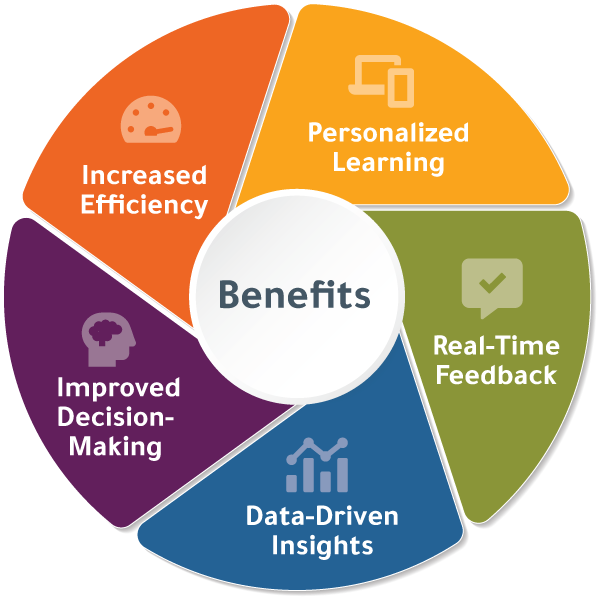Artificial Intelligence (AI) continues to change industries worldwide, from manufacturing to marketing. It impacts our work lives by shaping how we communicate, solve problems, and work. AI has the potential to both streamline complex processes and enhance human capabilities. As organizations evolve, the possibilities for AI are exciting and nearly endless.
In learning and development (L&D), AI offers huge potential. It can parse large amounts of data, predict trends, and reach informed conclusions faster than humans. With AI as a sidekick, HR professionals can help their companies grow by providing personalized development journeys based on employee skills and business needs. Or, brainstorming solutions to improve employee engagement after analyzing pulse survey results. These are just a few of the potential uses of AI in the industry.
But with this power comes responsibility, especially in HR, where fairness, privacy, and compliance are key. For HR and L&D professionals, responsible AI isn’t just a trend. It’s about ensuring ethical practices that protect and support employees while reducing bias. In this blog, we’ll look at what responsible AI means for L&D, how it’s used, best practices, and the benefits it can bring.
With AI as a sidekick, HR professionals can help their companies grow by providing personalized development journeys based on employee skills and business needs.
What Is Responsible AI for Learning and Development?
AI allows machines to do tasks that usually need human intellect. For example, speech recognition or problem solving. At a high level, AI learns patterns and associations from prior data and recorded human actions. And in many cases, AI can continue learning based on new information. The technologies that support AI are constantly evolving, and organizations are now widely using AI-connected systems across various areas of business. Given the speed with which these tools are being implemented, it is critical to follow responsible AI principles to ensure these systems are used ethically, fairly, and in ways that align with the users’ values.
As organizations adopt AI into their HR and L&D practices, responsible AI principles are crucial. Whether AI supports hiring, talent development, retention efforts or leadership training, ethical standards are vital. By using responsible AI, HR leaders can make sure AI enhances, rather than harms, fairness when managing talent.
Adding responsible AI to learning and development can boost human capabilities and make work faster. But the key to using AI responsibly is balancing efficiency with human-centered practices. For example, AI can offer insights by parsing large amounts of data to suggest a learning path through hundreds of courses and developmental experiences. However, an open conversation with a caring leader is still the best way to discover what learning best meets both the company’s needs and the individual’s personal needs.
The technologies that support AI are constantly evolving, and organizations are now widely using AI-connected systems across various areas of business.
How Is the L&D Industry Using Responsible AI?
The L&D industry is being actively encouraged to use AI in a number of ways to solve problems. And these use-cases will continue to grow over time as technology and our adoption of it grow. AI can help to create personalized learning experiences and provide data-driven feedback. For example, machine learning can analyze an employee’s performance and suggest tailored training to address skill gaps. Natural language processing (NLP) can power virtual coaches that help employees in real-time with informal, human-like language.
However, not all AI tools in HR have lived up to their promises. Consider facial expression analysis, a technique once viewed as promising for evaluating job candidates. Although it was claimed to give deeper insight into candidates, critics raised concerns about biases that could impact scoring and lead to unfair hiring decisions. Companies have since stopped using this technology and turned to more transparent and explainable methods to assess candidates. Although this technique has been discontinued, new applications of AI will likely be implemented before their risks and limitations are fully understood in the future, too. This makes it even more important that HR and L&D professionals look to responsible AI policies to guide their decisions.
Even with these challenges, responsible AI is transforming HR and L&D. By making sure AI is transparent, unbiased, and secure, companies can reap the advantages of AI while avoiding unintended illegal personnel practices.
Best Practices for Responsible AI in Learning and Development
To add AI into leadership training while upholding responsible AI standards, companies should follow these best practices. AI solutions must be:

1. Unbiased and Fair
- Diverse Data: AI models should be trained on diverse data to avoid biased outcomes.
- Bias Detection: Use techniques to find and reduce bias in AI systems. These might include fairness metrics and bias correction algorithms.
- Inclusive Teams: Include people from different backgrounds in the development process to help reduce bias in AI that might otherwise be overlooked.

2. Accurate and Audited
- Regular Audits: Continuously check AI systems to ensure fairness and accuracy.
- User Feedback: Get input from a diverse group of users to refine AI systems.

3. Secure
- Data Encryption: Protect sensitive customer data with encryption.
- Anonymization: Remove personal information from datasets to avoid misuse.
- Regular Security Audits: Conduct routine security checks to find and fix weaknesses.

4. Transparent
- Explainability: Make sure AI systems are clearly described, and information about how AI-derived information is used is plainly documented.

5. Globally Regulated
- Compliance: Stay updated on AI regulations like the EU’s AI Act (2024) and follow them.
Following responsible AI guidelines enables companies to use AI effectively for leadership training, with built-in safeguards for fairness, transparency, and human oversight.
Benefits of Using Responsible AI for Learning and Development
Adopting responsible AI offers several benefits for HR and L&D professionals:

1. Personalized Learning
AI can create custom training programs based on each leader’s needs.
2. Real-Time Feedback
AI tools can give immediate feedback, helping leaders grow faster. And, instant responses can guide leaders during moments of need when they’re seeking quick support.
3. Data-Driven Insights
AI analyzes large datasets (e.g., assessment results) to reveal trends and help design better training strategies.
4. Improved Decision-Making
AI enables HR leaders to make smarter decisions by providing data-rich insights.
5. Increased Efficiency
AI automates tasks, allowing HR teams to focus on strategic initiatives with high impact.
While AI has the potential to offer significant benefits, achieving these outcomes often requires specialized tools, expertise, and resources that not every HR department may have in-house. Organizations can maximize AI's impact by working with trusted partners like DDI who bring both advanced technology and deep expertise in leadership development.
AI technology is a powerful tool that can enhance human decision-making for improved business outcomes, from cost savings to increased employee engagement. These applications improve the leader development experience for both training facilitators and learners.
With Great AI Comes Great Responsibility
AI is changing the world of HR and leadership development, but it’s crucial to use it responsibly. Responsible AI guidelines help organizations use AI to its full potential while maintaining fairness, transparency, and trust.
As HR and L&D professionals continue using AI, they must do so with a sharp focus on responsible use. After all, when used responsibly, there’s practically no end to the potential applications of AI for HR and L&D. The powers of AI paired with high ethical standards can mean a more enjoyable, more efficient, and more personalized experience for everyone involved. But when these standards are missing, HR can put employees and organizations at tremendous risk. Ask yourself, are you certain that you are using AI responsibly?
For more on AI’s impact on leadership assessments, check out Are AI-Based Leadership Assessments Trustworthy?.
Verity Creedy is Vice President of DDI’s Product Management team and an award-winning blogger. Verity is obsessed with building powerful development experiences for leaders, trying to hold a decent plank for two minutes, and keeping indoor plants alive for more than six months.
Olivia Moore is a Senior Product Manager at DDI. When she isn’t focused on how evolving technologies can help solve problems for L&D and leaders, she can be found gathering eggs from her chickens, reading, and doing “mom things”.
Topics covered in this blog

